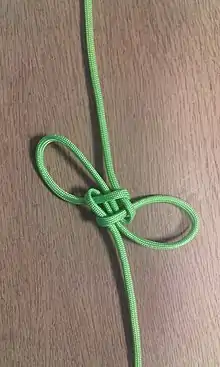Friendship knot
The friendship knot is a decorative knot which is used to tie neckerchieves, lanyards and in Chinese knotting.

| Friendship knot | |
|---|---|
 Friendship knot | |
| Names | Friendship knot, Chinese cross knot, Japanese crown knot, Square knot (British usage), Success knot, Rustler's knot, Buckaroo knot |
| Category | Decorative |
| Origin | China |
| Related | Carrick bend |
| Typical use | Neckerchieves, lanyards and Chinese knotting |
| ABoK | #808, #809, #1032, and #1066 |
History and use
This is one of the eleven basic knots of traditional Chinese knotting,[1] a craft which began in the Tang and Song Dynasty (960–1279 AD) in China. The Chinese and Japanese names for this knot are based on the shape of the ideogram for the number ten, which is in the shape of a cross that appears on one face (and a square on the other face).[2] The Ashley Book of Knots, first published in 1944, says: "A decorative Chinese Loop. This is commonly employed as a Lanyard Knot. It is handsome and secure."[3] In recent years, it has become popular with members of the Scout and Guide movements for tying their neckerchieves instead of using a woggle.[4]

A more complicated version of this knot with a loop on either side is called a winged cross knot in Chinese knotting and macramé.[5]
See also
- Diamond knot (also known as the "Friendship knot")
- Square knot
References
- Chinese Knotting, Lydia Chen, Echo Craft Books 1981 ISBN 0-8048-1389-2 (p.45)
- Wang, Carol. "Chinese Knotting: The Cross Knot (十字結, 叶結び)". www.chineseknotting.org. Retrieved 21 April 2018.
- The Ashley Book of Knots, Clifford W. Ashley, Doubleday, New York. ISBN 0-385-04025-3 (#1032)
- "Baggy's Den - The knot box". www.baggy.me.uk. Retrieved 21 April 2018.
- "Cross Knot - Winged cross". www.free-macrame-patterns.com. Acajou. Retrieved 16 September 2018.